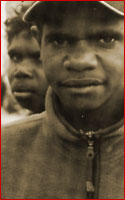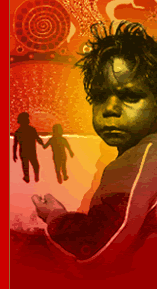| |
Media Releases
17 May 2006
Statement by SNAICC Chairperson,
Muriel Bamblett, calling for the Australian Goverment to lead the
way in developing a national plan to deal with family violence,
child abuse and child neglect.
Aboriginal and Torres
Strait Islander Children – Time for a National Strategy
The Australian Government
must use its leadership role to develop a national strategy to outline
a long term commitment to Indigenous children, Muriel Bamblett,
Chairperson of SNAICC, Australia’s national peak body for
Indigenous children said today.
“The recent controversies surrounding the high rates of child
abuse and neglect in Indigenous communities highlight the need for
a national commitment to protect our children from harm and secure
for them the life opportunities other Australian children enjoy,”
she said.
“Australia’s Indigenous communities need long term constructive
support from Governments to deal with and move beyond the crisis
in family violence, child abuse and child neglect,” Ms Bamblett
said.
She said, “SNAICC calls upon the Federal Minister Mal Brough
to capitalise on the national focus he has created on Aboriginal
children by developing a national strategy after consulting with
Indigenous organisations such as SNAICC and with the States and
Territories to distil from the many existing reports the most effective
and sustainable solutions.”
“For over 20 years SNAICC has highlighted the need for a national
approach to child welfare that deals with the immediate issues of
violence and abuse in a way that build on the strengths of Aboriginal
families and Aboriginal culture while working to prevent the abuse
from re-occurring in the next generation,” she said. “SNAICC,
and other Aboriginal organisations and leaders, have made these
issues clear to all governments on many occasions.”
Ms Bamblett said, “In 2003 SNAICC researched and published
a report that found the reasons behind the incidence of child abuse
are complex but relate to failures in policing and the Northern
Territory child protection system, a lack of resources for Aboriginal
child and family welfare agencies to deal with family violence and
the ongoing effects of socio-economic factors which undermine self-determination
and create a sense of hopelessness in some communities.” (See
State of Denial – The Abuse and Neglect of Aboriginal
Children in the Northern Territory, www.snaicc.asn.au/publications/)
“The reports recommendations remain largely ignored,”
she said.
“As far back as 1992 SNAICC produced, at the request of the
Commonwealth, A National Plan of Action for the Prevention of
Child Abuse. The report was accepted but never implemented,”
she said.
Key measures SNAICC considered essential to providing social justice
for Aboriginal and Torres Strait Islander children include:
- All States, Territories, the Commonwealth and SNAICC agreeing
to a National Policy for Aboriginal and Torres Strait Islander
children which has as its central objective reducing the harm
experienced by Aboriginal and Torres Strait Islander and reducing
their over representation in child protection.
- Lifting the capacity of child protection systems and policing
to ensure families can speak out against abuse and violence without
fear of reprisal.
- Establishing broad, holistic and accessible Indigenous family
support services within all Indigenous communities to provide
practical parenting and family support and maintain a focus on
preventing abuse and family violence.
- Making a national commitment to expand early childhood development
programs and services for Indigenous to ensure all Indigenous
children have access to quality children’s services and
preschool education - currently less than half of Australia’s
Indigenous children can access pre school education and other
early childhood programs and the proportion is declining.
- Focusing on healing and treatment to deal with perpetrators
and break the intergenerational cycle of abuse.
Ms Bamblett said, “Aboriginal
and Torres Strait Islander children are massively over represented
in the care and protection system and massively under represented
in preschool education, childcare and other early childhood development
programs. Reversing this picture was the key to providing children
with a better future.”
“Children depend on others to protect them from harm and abuse
and to respond when they have been the victims of such crimes. The
solutions to these issues will be found when all governments agree
to work together with SNAICC and local Indigenous communities to
develop a national commitment to children – a commitment SNAICC
has been seeking for 20 years,” she said.
For
Media inquiries, contact SNAICC: 03 9489 8099
The media release is also
available for download as a PDF here.
|
 |



